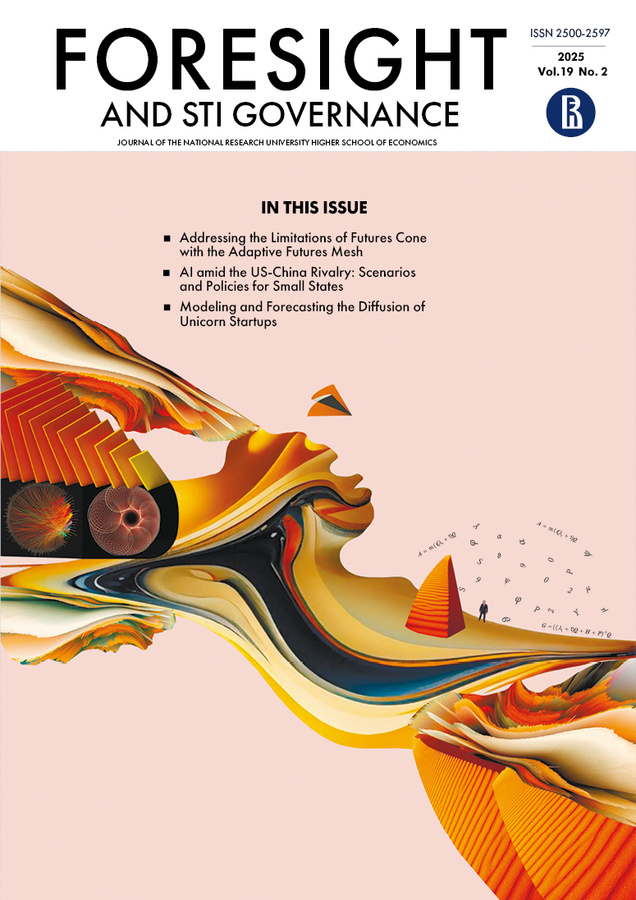Contemporary Practices of Intelligence Support for Competitiveness
- Authors: Sewdass N.1, Calof J.2,3,4
-
Affiliations:
- University of South Africa
- HSE University
- Telfer School of Management
- North-Western University
- Issue: Vol 14, No 3 (2020): SPECIAL ISSUE “COMPETITIVE INTELLIGENCE”
- Pages: 30-39
- Section: STRATEGIES
- URL: https://journals.rcsi.science/1995-459X/article/view/346978
- DOI: https://doi.org/10.17323/2500-2597.2020.3.30.39
- ID: 346978
Cite item
Abstract
About the authors
Nisha Sewdass
University of South Africa
Email: sewdan@unisa.ac.za
Preller St., Muckleneuk, Pretoria, 0002, South Africa
Jonathan Calof
HSE University; Telfer School of Management; North-Western University
Email: calof@telfer.uottawa.ca
University of Ottawa, 55 Laurier Ave E, Ottawa, ON K1N 6N5, Canada; 11 Hoffman St, Potchefstroom, 2520, South Africa
References
- Badr A., Madden E., Wright S. (2006) The contribution of CI to the strategic decision-making process: Empirical study of the European pharmaceutical industry // Journal of Competitive Intelligence and Management. Vol. 3. № 4. P. 15-35.
- Barnea A. (2016) Study on Competitive Intelligence in Israel // Journal of Intelligence Studies in Business. Vol. 6. № 2. P. 5-16.
- Bisson C., Tang Tong M.M. (2018) Investigating the competitive intelligence practices of Peruvian fresh grapes exporters // Journal of Intelligence Studies in Business. Vol. 8. № 2. P. 43-61.
- Brody R. (2008) Issues in defining competitive intelligence: An exploration // Journal of Competitive Intelligence and Management. Vol. 4. № 3. P. 3-16.
- Bulger N.J. (2016) The Evolving Role of Intelligence: Migrating from Traditional Competitive Intelligence to Integrated Intelligence // The International Journal of Intelligence, Security, and Public Affairs. Vol. 18. № 1. P. 57-84. DOI:https://doi.org/10.1080/23800992.2016.1150691
- Calof J. (2017a) Canadian competitive intelligence practices - a study of practicing strategic and competitive intelligence professionals' Canadian members // Foresight. Vol. 19. № 6. P. 577-589. Режим доступа: , дата обращения 26.05.2020. DOI:https://doi.org/10.1108/FS-07-2017-0024
- Calof J. (2017b) Reflections on the Canadian Government in competitive intelligence - programs and impacts // Foresight. Vol. 19. № 1. P. 31-47. Режим доступа: , дата обращения 26.05.2020. DOI:https://doi.org/10.1108/FS-08-2016-0038
- Calof J., Skinner B. (1998) Competitive intelligence for managers // Optimum. Vol. 28. № 2. P. 38-43.
- Calof J.L. (2016) Government sponsored competitive intelligence for regional and sectoral economic development: Canadian experiences // Journal of Intelligence Studies in Business. Vol. 6. № 1. P. 48-58.
- Calof J.L., Arcos R., Sewdass N. (2018) Competitive intelligence practices of European firms // Technology Analysis and Strategic Management. Vol. 30. № 6. P. 658-671. DOI:https://doi.org/10.1080/09537325.2017.1337890
- Crayon (2019) State of Competitive Intelligence 2019. Режим доступа:https://www.crayon.co/state-of-competitive-intelligence, дата обращения 02.05.2019.
- Crayon (2020) State of Competitive Intelligence 2020. Режим доступа:https://www.crayon.co/state-of-competitive-intelligence, дата обращения 02.02.2020.
- Dishman P.L., Calof J.L. (2008) Competitive intelligence: A multiphasic precedent to marketing strategy // European Journal of Marketing. Vol. 42. № 7/8. P. 766-785.
- Du Toit A. (2015) Competitive intelligence research: An investigation of trends in the literature // Journal of Intelligence Studies in Business. Vol. 5. № 2. P. 14-21.
- Du Toit A.S.A., Sewdass N. (2014) Competitive intelligence in Morocco // African Journal of Library, Archives and Information Science. Vol. 24. № 1. P. 3-13.
- Fehringer D., Hohhof B., Johnson T. (eds.) (2006) State of the Art Competitive Intelligence. Competitive Intelligence Foundation Research Report. Alexandria, VA: Society of Competitive Intelligence Professionals.
- Fleisher C.S., Bensoussan B.E. (2007) Business and Competitive Analysis. Upper Saddle River, NJ: FT Press.
- M-Brain (2015) Global Market Intelligence Survey 2015. Режим доступа:https://www.m-brain.com/blog-posts/2015-market-intelligence-survey-report/, дата обращения 12.02.2020.
- M-Brain (2019) Global Market Intelligence Survey 2019. Режим доступа:https://www.m-brain.com/white-papers/global-intelligence-survey-2019/дата обращения 17.03.2020.
- McGonagle J.J. (2016) Guide to the study of intelligence // Journal of U.S. Intelligence Studies. Vol. 22. № 2. P. 55-59.
- Nasri W. (2011) Competitive Intelligence in Tunisian Companies // Journal of Enterprise Information Management. Vol. 24. № 1. P. 53-67.
- Ojinaga E.R.P. (2018) Exploratory study of competitive intelligence in Mexico // Journal of Intelligence Studies in Business. Vol. 8. № 3. P. 22-31.
- Sewdass N., Du Toit A.S.A. (2014) Current state of competitive intelligence in South Africa // International Journal of Information Management. Vol. 34. № 2. P. 185-190.
- Sewdass N., Du Toit A.S.A. (2015) Competitive Intelligence in emerging economies: A comparative study between Brazil and South Africa // TD The Journal of Transdisciplinary Research in Southern Africa. Vol. 11. № 1. P. 113-132.
- Sharp S. (2000) Truth or Consequences: 10 Myths that Cripple Competitive Intelligence // Competitive Intelligence Magazine. Vol. 3. № 1. P. 1-6.
- Stanat R. (2008) Global competitive intelligence blueprint // Competitive Intelligence Magazine. Vol. 11. № 3. P. 6-11.
- Tanev S., Bailetti T. (2008) Competitive intelligence information and innovation in small Canadian firms // European Journal of Marketing. Vol. 42. № 7/8. P. 786-803. Режим доступа: , дата обращения 16.04.2020. DOI:https://doi.org/10.1108/03090560810877150
Supplementary files









